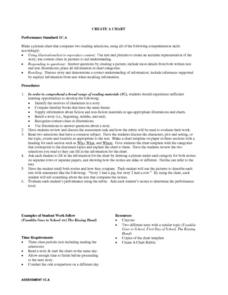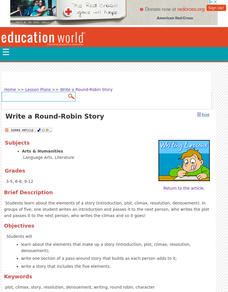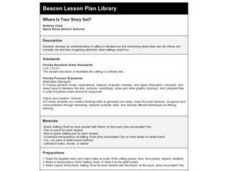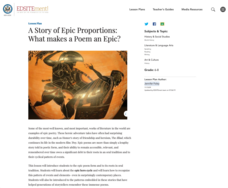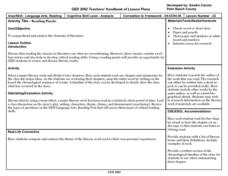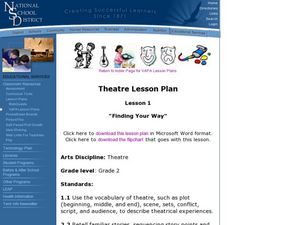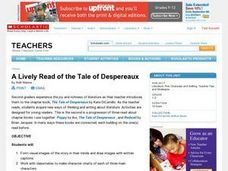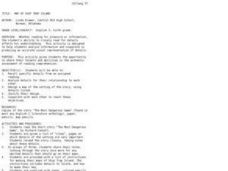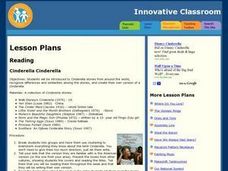Curated OER
Noisy Nora, Studious Students: Story Elements
Alliterative adjective nicknames generate stories inspired by Rosemary Wells' book Noisy Nora (also a thematic complement to any class with children who make a ruckus to get attention). Class members explore basic story elements --...
Curated OER
Plot and Conflict in W.W. Jacob's "The Monkey's Paw"
Tenth graders analyze the use of literary elements in W.W. Jacob's "The Monkey's Paw." Literary analysis is accomplished by a review of the plot and order of events in the story. Learners work in pairs to match the events from the story...
Curated OER
Create a Chart
Students create charts for story elements. They read two selections that share a common theme and discuss the story elements. They create a chart for the characters, plot, and setting and complete it while reading the selections.
Curated OER
Write a Round-Robin Story
Students discover the elements of a story (introduction, plot, climax, resolution, denouement). In groups of five, one student writes an introduction and passes it to the next person, who writes the plot and passes it to the next person,...
Pennsylvania Department of Education
Drawing Conclusions Based on Literary Elements
Students compare versions of Cinderella and draw conclusions based on the story elements identified. In this literacy comprehension and story elements lesson, students read several versions of Cinderella, complete a "Comparing Folklore"...
Curated OER
Where Is Your Story Set?
Students explore the concept of setting in literature by identifying their own current setting, and imagining what their ideal setting would be. They read a piece of literature, identify the setting and record the information on a chart.
Curated OER
Predicting a Solution to a Problem
Students explore story structure. In this story structure literacy lesson, students listen to the story Ruby's Wish by Shirin Yim Bridges, stopping at points to identify a problem and predict possible solutions which are then written on...
Curated OER
Building Fiction: Elements of a Short Story
Students define and interpret the elements found in a short story. Then they identify the elements of plot found in a short story. Students also apply knowledge of plot to an original work of fiction. Finally, they identify the...
Curated OER
Perfecting My Pal's Poe Paragraph
After analyzing the compelling first paragraph of Edgar Allen Poe's short story "The Masque of the Red Death," high schoolers draft original opening paragraphs using techniques identified Poe's writing. The relationship between suspense...
National Endowment for the Humanities
A Story of Epic Proportions: What Makes a Poem an Epic?
Learners analyze the epic poem form and its roots in oral tradition. In this epic poetry lesson, students research the epic hero cycle and recognize the pattern of events and elements. Learners analyze the patterns embedded in the stories.
Curated OER
Reading Puzzle
Twelfth graders examine the elements of literature. They each read a chapter of a novel, sequentially list the main ideas, present a summary of the chapter to the class, sequence the events, and review the novel by summarizing the timeline.
Curated OER
Introduce Vocabulary: Clap Your Hands
Read Clap Your Hands to explore new vocabulary with your class. In this three-tiered vocabulary instructional activity, youngsters read the book and identify the plot, setting, and characters. They also define vocabulary terms from...
Curated OER
Theatre Lesson Plan: Finding Your Way
Second graders identify story elements in familiar stories from their lives. In this story elements lesson, 2nd graders act out familiar activities by following directions. Students read a story and discuss the story elements....
Curated OER
Life Size Characters
Sixth graders analyze character traits and create a life size character outline. In this character analysis lesson, 6th graders analyze character traits of a character using character webs and poems. Students then create a life size...
Curated OER
Lively Read of the Tale of Despereaux
Students create a character map of the main characters in The Tale of Despereaux. After reading the text, students create a character chart based on information they gleaned from the story. They use this information to write a letter...
Curated OER
Learning Plot
Tenth graders identify certain literary elements such as conflict, and exposition within the text of a variety of studenT books. Aspects of literary elements such as theme, and allusion are explored in this lesson.
Curated OER
A Picture Says a Thousand Words
Use photographs to trigger memories. Writers use a personal photograph as a starting point for an autobiographical writing exercise. They complete brainstorming activities that have them study their photograph before actually putting pen...
Curated OER
Map of Ship Trap Island
Students read the short story "The Most Dangerous Game," and create maps of Ship Trap Island and justify why items are placed on their map in certain locations.
Curated OER
Using Plot Elements to Retell a Story
Sixth graders chart a story. In this plot elements lesson plan students chart and then retell a story from the rising action until the resolution. Students use stories from the book America Street.
Curated OER
Cinderella Cinderella
Students compare and contrast various versions of the story Cinderella and create their own version. They read versions of Cinderella and identify their components including setting, characters, events/plot, magic and biographical...
Curated OER
What's the Problem? Exploring Conflict in "On the Sidewalk Bleeding"
Students use the story 'On the Sidewalk Bleeding' to analyze the various conflict types found in literature. In this conflict lesson, students view a PowerPoint about the story and identify the four types of conflict. Students identify...
Curated OER
Comprehension: Setting
Young scholars discuss what setting represents. In this language arts lesson plan, students review the three elements of setting: where the story takes place, when does the story take place, and is it past, present, or future? Young...
Curated OER
Cause and Effect with "Cloudy With a Chance of Meatballs"
Fourth graders explore reasoning by reading a book with their classmates. In this cause and effect lesson, 4th graders read the children's story Cloudy with a Chance of Meatballs and discuss the story elements, characters and plot....
Curated OER
Narrative Literature Response Letters: Original Lesson Plan
Readers write a formal letter to an author offering an alternative ending to a story the author has written. First, the class reads a story or novel. Upon finishing the reading, they are introduced to the format of a formal letter. They...


